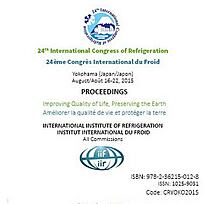
IIR document
Effect of gap-junctional cell-to-cell communication on intracellular ice propagation and consequent cell viability.
Number: pap. n. 437
Author(s) : FUKUNAGA T., KUBO H., KURATA K., et al.
Summary
Intracellular ice formation (IIF) propagates from cell to cell and causes lethal damage to the cell during the freezing process. In this study, we hypothesized that IIF passes through gap junctions between cells and that blockage of gap junctions increases cell viability after the freeze–thaw process because of the inhibited IIF propagation. Monolayer cultures of Madin–Darby canine kidney (MDCK) cells on glass coverslips were preincubated with and without the gap-junction blocker heptanol and subsequently frozen at different cooling rates on a temperature-controlled stage. Microscopic observations showed that IIF propagation was successfully inhibited in the blocked group. However, cell viability in the blocked group after thawing was significantly lower than that in the non-blocked group. Although results of this study did not confirm our hypotheses, they indicated the important role of gap-junctional communication in the occurrence of IIF and the consequent cell damage.
Available documents
Format PDF
Pages: 7 p.
Available
Public price
20 €
Member price*
Free
* Best rate depending on membership category (see the detailed benefits of individual and corporate memberships).
Details
- Original title: Effect of gap-junctional cell-to-cell communication on intracellular ice propagation and consequent cell viability.
- Record ID : 30015855
- Languages: English
- Source: Proceedings of the 24th IIR International Congress of Refrigeration: Yokohama, Japan, August 16-22, 2015.
- Publication date: 2015/08/16
- DOI: http://dx.doi.org/10.18462/iir.icr.2015.0437
Links
See other articles from the proceedings (657)
See the conference proceedings
Indexing
-
Effects of ice seeding temperature on intracell...
- Author(s) : WANG Y., ZHU K.
- Date : 2015/08/16
- Languages : English
- Source: Proceedings of the 24th IIR International Congress of Refrigeration: Yokohama, Japan, August 16-22, 2015.
- Formats : PDF
View record
-
ISOTHERMAL NUCLEATION STAGE AND ITS APPLICATION...
- Author(s) : HUBEL A., TONER M., CRAVALHO E. G.
- Date : 1987/08/24
- Languages : English
- Source: Development in refrigeration, refrigeration for development. Proceedings of the XVIIth international Congress of Refrigeration.
- Formats : PDF
View record
-
VISUALIZATION OF FREEZING DAMAGE TO BIOLOGICAL ...
- Author(s) : ENGLICH S., KORBER C., RAU G.
- Date : 1987/08/24
- Languages : English
- Source: Development in refrigeration, refrigeration for development. Proceedings of the XVIIth international Congress of Refrigeration.
- Formats : PDF
View record
-
Observations of proliferation and division of f...
- Author(s) : SUMIDA S., KITAMURA T., KAIHOU T., et al.
- Date : 2017/05/15
- Languages : English
- Source: Cryogenics 2017. Proceedings of the 14th IIR International Conference: Dresden, Germany, Mai 15-19, 2017.
- Formats : PDF
View record
-
CRYOBIOLOGY OF REPRODUCTIVE CELLS.
- Author(s) : GRISCENKO V. I.
- Date : 1987/08/02
- Languages : Russian
View record
